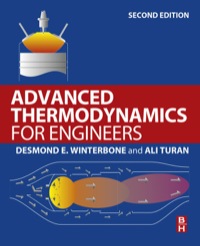Calculate the lower heat of reaction at constant volume for benzene (mathrm{C}_{6} mathrm{H}_{6}) at (25^{circ} mathrm{C}). The
Question:
Calculate the lower heat of reaction at constant volume for benzene \(\mathrm{C}_{6} \mathrm{H}_{6}\) at \(25^{\circ} \mathrm{C}\). The heats of formation at \(25^{\circ} \mathrm{C}\) are: benzene, \(\left(\mathrm{C}_{6} \mathrm{H}_{6}\right) 80.3 \mathrm{MJ} / \mathrm{kmol}\); water vapour \(\left(\mathrm{H}_{2} \mathrm{O}\right)\), \(-242 \mathrm{MJ} / \mathrm{kmol}\); carbon dioxide \(\left(\mathrm{CO}_{2}\right)\), \(-394.0 \mathrm{MJ} / \mathrm{kmol}\).
A mixture of one part by volume of vaporised benzene to fifty parts by volume of air is ignited in a cylinder and adiabatic combustion ensues at constant volume. If the initial pressure and temperature of the mixture are \(10 \mathrm{bar}\) and \(500 \mathrm{~K}\) respectively, calculate the maximum pressure and temperature after combustion neglecting dissociation. (Assume the internal energy of the fuel is \(8201 \mathrm{~kJ} / \mathrm{kmol}\) at \(298 \mathrm{~K}\) and \(12,998 \mathrm{~kJ} / \mathrm{kmol}\) at \(500 \mathrm{~K}\) ) [-3170 MJ/kmol; \(52.11 \mathrm{bar} ; 2580 \mathrm{~K}]\)
Step by Step Answer:

Advanced Thermodynamics For Engineers
ISBN: 9780080999838
2nd Edition
Authors: D. E. Winterbone, Ali Turan





